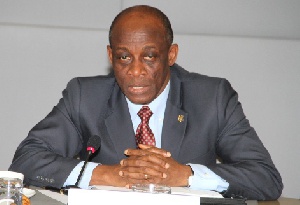Business News of Tuesday, 29 July 2014
Source: B&FT
Bumpy road ahead - A Mid-Year Review Analysis
July’s mid-year review by the Minister of Finance was inevitable given the severe shocks the economy suffered during the first six months of 2014. Those same shocks, which soured already grim sentiments on the economy, had compelled the Minister to make an “urgent policy statement” to Parliament in April in a bid to provide reassurance.
The review was extensive and put the economy’s challenges in context. These challenges include revenue and grant shortfalls; the falling cedi; still-low gold prices which is affecting production; power supply disruptions; high interest costs; problems with public-sector wage management; surging inflation; and energy subsidies.
None of these difficulties is to be taken lightly, but the biggest concern has to be the alarming depreciation of the cedi, which has fanned the fiscal flames that have been burning since the end of 2012. The falling currency is the main cause of rising prices of petroleum products, with petrol costing 53 percent more today than in January, and is fuelling a general increase in inflation.
The weak cedi also explains the stern monetary-policy stance of the Bank of Ghana that has pushed interest rates to record levels: at the last auction of Treasury bills, government paid approximately 25 percent to borrow for 91 days.
In an attempt to limit the repercussions of the sliding currency on inflation and workers’ incomes, government permitted some subsidies on petroleum and utilities, and the subsidy bill for the year has now been revised from GH¢50million (0.04 percent of GDP) to GH¢619million (0.54 percent of GDP).
This is partly responsible for the upward revision of the budget deficit by 0.3 percentage points to 8.8 percent of GDP. All these developments show that stemming the cedi’s decline is critical to improve the economic outlook.
There are positive signs that dollar inflows into the country will pick up due to the expected Eurobond and foreign syndicated loan for the cocoa sector. These inflows should strengthen the central bank’s reserves and shore-up its capacity to defend the cedi against real demand pressures as well as pressures of a speculative kind.
While the budget outlined some medium-term measures to support the currency, volatilities in the short-term can only be addressed by effective short-term policy responses.
One lesson from the current bout of depreciation is that the central bank has to improve its reserve management, since this is important to smoothen its intervention in the currency market. It is true that the reserves are affected by seasonality of foreign exchange inflows, but the bank must act to reduce the effect of this element, going forward – lest speculators take advantage of this limitation to manipulate the market.
There is obviously a strong will and effort to stabilise the cedi, but this seems to be undermined by the slow fiscal recovery and lingering market concerns about policy credibility.
Power supply disruptions were a major source of anxiety among individuals and firms in the first half of the year. The GDP data released for the first quarter proved that the disruptions constrained output as manufacturing fell at an annual rate of 19.3 percent in the period and construction growth slowed from 8.1 percent a year earlier to 4.7 percent.
Thankfully, the shortage of generation has lessened, though fuel supply problems continue to increase generation costs. Averting energy shortages during the rest of the year should support achievement of the 7.1 percent economic growth target.
The frequent downtime of the Volta River Authority (VRA)’s thermal plants in the first half as well as challenges in generation from the Bui dam call for better management of infrastructure by both power entities.
VRA’s maintenance schedules must be planned to cause little disruption to power availability and the Bui Power Authority should manage the Bui dam taking into consideration its peculiar operational requirements.
Wage bill
The cost of public sector wages is a continuing threat to the fiscal outlook. Wage expenditure jumped at an annual rate of 26.2 percent in the first five months of the year, faster than inflation and nominal GDP. The situation could have been worse but for workers’ considerate posture in wage negotiations and government’s own resolute stance on the issue.
Negotiations for 2015 wages, which the Finance Minister hopes to be completed before the presentation of next year’s budget in November, will however be tough as workers will look forward to reclaiming some of their lost purchasing power in 2014. The expiry of the Cost-of-Living Allowance (COLA) at year-end will also add to wage pressures.
The Minister’s review revealed considerable progress that has been made to check inefficiencies and leakages in the public sector payroll system. Steps taken so far have to be strengthened so that the anticipated savings will be realised quickly.
Nevertheless, the goal of cutting the wage-to-tax revenue ratio to 35 percent by 2017 seems impossible unless some rationalisation of the public sector workforce is carried out in addition to ongoing reforms. Budget deficit
While the budget deficit target has been revised upwards to accommodate expenditure overruns, subsidies in the energy sector, high debt-servicing costs and the shortfall in grants from donors – a source of fiscal pressure in recent years – pose a risk to the realisation of the new target.
Regarding grants, the Ministry’s projection looks optimistic if viewed in the context of donors’ tight-fistedness in recent years. It probably would make sense to plan a contingency should donors disappoint again. Growing pains
To say it bluntly, the problems facing the country presently were created by fiscal mismanagement in 2012, which has exacerbated the pains of transitioning into a state of relative economic independence whereby less support is received from donors than previously.
The road ahead will be bumpy, no doubt, and government will have to step on many toes – including turning a deaf ear sometimes to the public outcry – to pull off a real recovery.











